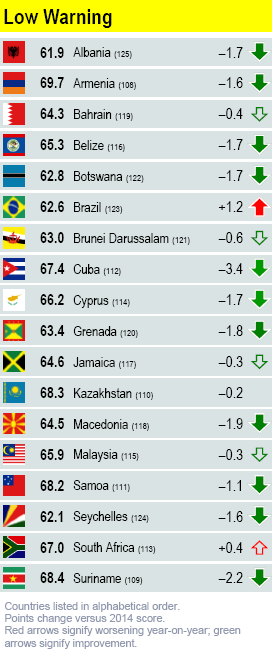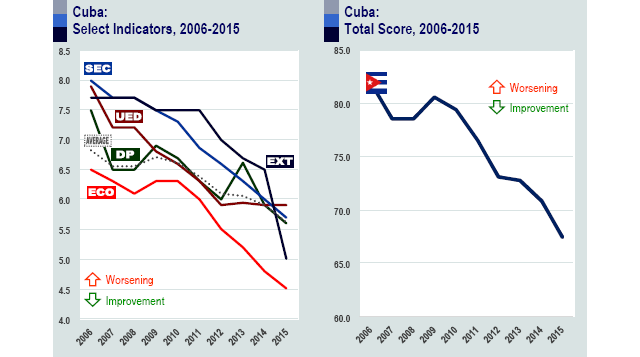BY PATRICIA TAFT AND KENDALL LAWRENCE
 At the end of 2014, Cuba suddenly became news again when U.S. President Obama announced a plan to normalize relations with the country after nearly fifty years of political and economic isolation. But even before the announcement, Cuba was already on track to be one of the most improved countries in the 2014 Fragile States Index.
At the end of 2014, Cuba suddenly became news again when U.S. President Obama announced a plan to normalize relations with the country after nearly fifty years of political and economic isolation. But even before the announcement, Cuba was already on track to be one of the most improved countries in the 2014 Fragile States Index.
In areas like the provision of Public Services, Cuba’s score has worsened slightly over ten years although all other indicators have improved. In the areas of Human Rights and State Legitimacy, there was a worsening over the past year as reports alleged extrajudicial abuse by public security forces and the continued repression of political opposition. Despite these negative marks, the trend over the past decade continues to be positive.
One of the driving forces behind Cuba’s improvement has been the success of economic reforms over the past few years that have opened Cuba up to new foreign investment opportunities. In March 2014, Cuba began mending fences with the European Union and accepted foreign investment from Brazil to modernize a deep water port, which has the potential to become the largest in the Caribbean. And although according to the U.S.-Cuba Trade and Economic Council, 2014 had the lowest trading numbers between the U.S. and Cuba since 2004, the country’s overall economic forecast continues to look positive as it reaches out to other foreign markets.

For Cuba, led by Fidel Castro’s younger brother President Raul Castro, the need to explore new diplomatic relations had also become an economic necessity. Since the U.S. embargo was enforced in 1961 and tightened further by Congress in 1996, Cuba’s restricted economy has relied on subsidies from the Soviet Union and more recently Venezuela. However Venezuela’s own fortunes took a turn in 2014, with its 2015 Index score worsening by 1.9 points, propelled by the slump in world oil prices. With oil accounting for 95 per cent of Venezuela’s export earnings, its heavily subsidized oil exports to Cuba have come under increasing pressure.
Recent developments may hamper progress slightly, driven by some U.S. Congressional opposition to further opening relations with Cuba. However this should not be confused or conflated with the sustained performance of Cuba over the past decade. Indeed, the nature of Cuba’s recent improvement, somewhat irrespective of U.S. policy, suggests that this is a positive trend that will be difficult to reverse.
Overall, the combination of the opening of economic space with the normalization of diplomatic relations between the island and the U.S. will surely be trends to watch in the coming year to see whether Cuba not only continues to improve, but also capitalizes on its new connections for growth.
